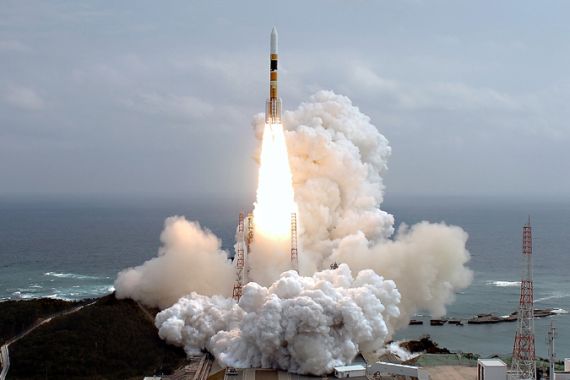Japan’s Venus mission fails
Country’s probe sent on a two-year mission is unsuccessful in entering Venus’ orbit.

 |
| Japan has long been a leading space-faring nation and its space missions have met success in the past [GALLO/GETTY] |
A Japanese probe sent on a two-year mission to Venus failed to enter orbit and may have flown past the planet.
The failure on Wednesday was a big letdown for Japan’s space program. But Japan’s space agency, called JAXA, has not given up hope.
Keep reading
list of 4 itemsAfter the Hurricane
World’s coral reefs face global bleaching crisis
Why is Germany maintaining economic ties with China?
“Unfortunately, it did not attain an orbit. But it appears to be functioning and we may be able to try again when it passes by Venus six years from now,” Hitoshi Soeno of JAXA said.
The probe, called Akatsuki, which means ‘dawn’, was launched on May 20 this year.
It appears to have not fired its engines enough to inject it into the proper orbit after it passed near Venus on Tuesday. The space agency said that it still had communication with the probe.
The probe was designed to monitor volcanic activity on Venus and provide data on its thick cloud cover and climate, including whether the planet has lightning. It is equipped with infrared cameras and other instruments to carry out its mission.
Officials said that the probe lost communications shortly after firing its engines to place it in orbit.
Communication was restored, but the probe put itself on safety mode and did not achieve the position it needed to reach orbit.
Missed opportunity
Inserting the probe into orbit would have been a big success for Japan, which previously failed in an effort to put probes around Mars.
The Mars mission, called Nozomi, or ‘hope’, was launched in 1998 and it experienced a series of technical glitches.
The $300m Akatsuki probe was to maintain an elliptical orbit around Venus, ranging from passes from the planet’s surface to outer swings that would have allowed it to comprehensively monitor weather patterns.
Japan has long been one of the world’s leading space-faring nations. In 1970, it became the first Asian country to put a satellite in orbit around the Earth.
It has also developed a highly reliable booster rocket in its H-2 series.
Japanese scientists had been hopeful of success with the Venus probe after the country recently brought a probe back from a trip to an asteroid.
Russia, the United States and the Europeans have successfully explored other planets. The Russian space program has been sending missions to Venus since 1961 with more than 30 attempts although its early missions were marred with many failures.
But in recent years, Japan has been overshadowed by the big strides of China, which has put astronauts in space twice since 2003 and was the third country to send a human into orbit after Russia and the United States.
Japan’s space program has never attempted a manned flight and instead operates on a shoestring budget that focuses primarily on small-scale scientific projects.